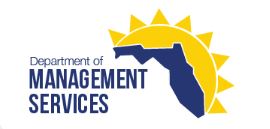Florida statewide radio system still in limbo as deadlines approach
State of Florida officials continue to talk with L3Harris about Statewide Law Enforcement Radio System (SLERS) contract extension as initial steps are being taken to procure a new SLERS, members of the SLERS Joint Task Force Technical Committee were told yesterday—less than five months before the state Legislature meets.
“We are currently still in contact with L3Harris regarding a potential contract extension,” Matt Matney, public safety bureau chief for the Florida Department of Management Services (DMS) division of state technology, told the committee.
L3Harris owns and operates SLERS—a statewide LMR system that uses EDACS technology—but the current contract is due to expire at the end of June 2021, necessitating the need for a SLERS contract extension.
Florida officials had hoped to have a new SLERS II statewide system operational when the current contract expires, but the state was unable to reach an agreement with selected vendor Motorola Solution to build the proposed P25 Phase II network. In the current state budget, DMS is required to procure a new statewide system that “at a minimum, … must utilize the industry-standard Project 25 Phase II delivery methodology.”
Consulting firm Federal Engineering is expected to deliver a business case for the second SLERS II procurement by the end of month, according to Matney.
“We anticipate that there are no big surprises in that document, but we will know more at the end of the month,” he said.
Representatives of agencies that utilize SLERS have emphasized the need to get clarity about the availability of the radio system—and under what financial and logistical conditions—as soon as possible, so they can make technical and budgetary plans before the Florida Legislature begins its session on March 2.
Technical Committee member Vic Thomas, communications systems manager for the Florida Highway Patrol, reiterated this need for information about SLERS prior to the legislative session.
“If there’s anything required by the agencies in addition to what we are doing today, we need to know that before the session, so we can deal with that during the session,” Thomas said during the meeting.
With no extension agreement with L3Harris in place at the moment, Matney said he could not say whether agencies using SLERS would need additional funding to maintain their current service levels.
Most sources have expressed optimism that DMS will be able to reach an agreement with L3Harris on a SLERS contract extension, but the lack of a deal at the moment caused Thomas and Matney to contemplate the possibility of agencies not having SLERS next July.
“So, we may not know if we’re going to have a radio system until the end of [the legislative] session, right?” Thomas asked.
Matney replied, “I am unable to say at this time the dates when we’ll know whether we’re going to have a system or not.”
Many Florida state and local agencies depend on SLERS to deliver mission-critical voice communications, even in the wake of natural disasters like hurricanes. Although officials have applauded the reliability of SLERS, the state has planned an upgrade from the aging EDACS technology for several years and selected Motorola Solutions to build a P25 system after a lengthy procurement process, which included a protest from L3Harris.
But DMS announced in January that it ended talks with Motorola Solutions after the LMR giant declined to sign a contract based on the terms of its bid, according to a state official.
At the time, Florida DMS Secretary Jonathan Satter wrote in a letter to Motorola Solutions that Florida DMS would “move toward the new procurement of a next-generation system.” To date, Florida DMS has not responded to multiple inquiries from IWCE’s Urgent Communications seeking clarification about what technology would be used in a “next-generation system.”
However, the description in the $2.4 million state budget item provides some guidance about the state’s current vision for SLERS II.
“[DMS] must release a competitive procurement and, thereafter, issue an award for the replacement of the Statewide Law Enforcement Radio System,” according to the budget item. “At a minimum, future services must utilize the industry-standard Project 25 Phase II delivery methodology. The procurement must also consider emerging technologies to enhance interoperability, promote public safety, improve coverage and enhance audio clarity.”
This budget item also calls on DMS to pursue a resolution to a dispute surrounding access to towers owned by L3Harris. This tower issue was one of the problematic issues undermining the ability to reach a contract agreement with Motorola Solutions on a proposed SLERS upgrade to P25 Phase II technology, but the matter was not mentioned during this week’s meeting of Joint Task Force Technical Committee.
Although the tower dispute was a problem, most sources familiar with the failed Motorola Solutions talks indicated that biggest sticking point in the negotiations was a “termination for convenience” clause, which would let the state to back out of the potential 20-year deal whenever it wanted with little advance notice. All vendors seeking the P25 contract were required to accept this condition during the bidding process, but Motorola Solutions would not accept it as part of the contract with the state, according to a letter from Satter.
Such a “termination for convenience” clause is not new to LMR contracts—in fact, similar language is included in the existing SLERS deal with L3Harris—but most of those agreements were signed at a time when there was not any practical technological alternative to LMR that could provide reliable mission-critical voice communications, according to industry sources. Today, push-to-talk-over-cellular services through providers like FirstNet and Verizon are maturing quickly and could represent a viable alternative to LMR in the future, sources say.
















